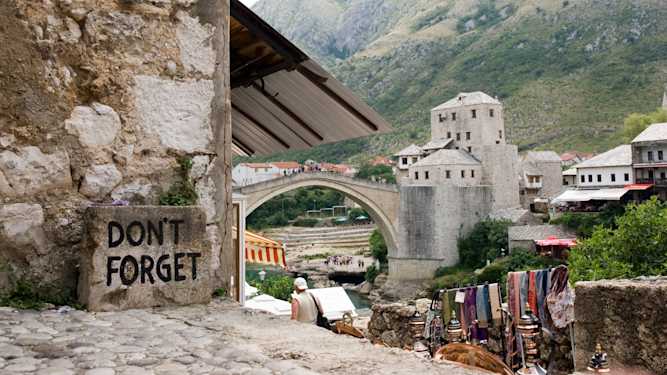
Bosnia 2025 - May
Throughout 2025, Ian Bancroft is collecting reflections on Bosnia-Herzegovina thirty years on from the end of the war. These reflections, supplemented by other insights and stories,explore various dimensions (peacebuilding, reconciliation, culture,education, politics), while reflecting on the past and the future.
To contribute your reflections on Bosnia-Herzegovina, please click here.
Read previous months here:
Faruk Kajtaz from Mostar, author of 'Mostar - War Stories', asserts that the country remains ‘more or less in the same place it has been for years.’
This stagnation is attributed to a fundamental flaw: ‘the system of state administration that was formed in Dayton was designed to produce crises and was supposed to serve only to stop the war, not as a “permanent solution”.’
BiH's ‘ethno-democracy is focused only on national issues and the needs of the political elite embodied in the leaders of the three peoples,’ ensuring that ‘the interests of citizens are always in the background.’ This inherent design flaw means BiH ‘lags behind in all areas.’
The international community is criticized for not having ‘enough initiative’, even though ‘Dayton is its “product”,’ while neighboring countries are seen to ‘continue to implement their great State projects in various ways, through their “proxy” partners.’ This interplay contributes to a prevailing sentiment of ‘more pessimism than optimism.’
Faruk insists the current system must change, ‘but the question is how?’ This is especially challenging ‘if the West implements principles that do not apply in their countries.’
A dangerous dynamic is observed: ‘the game of exhaustion is on the scene in order to bring the state to a fait accompli, and the political representatives of Sarajevo force a division, which will not be literal, but will only leave a shell of the state.’ Consequently, ‘the story of the EU path is not possible with leaders like Dodik and with a system that is part of the peace agreement.’
The ideal future for BiH is envisioned as a ‘complex state, but also with a dose of proven solutions, which will not produce crises.’ Faruk argues that if ‘the Dayton Agreement were implemented in any state with multiple nations, the outcome would be the same regardless of the level of development.’
Instead, ‘BiH needs a modern state of regions, not medieval despotisms in the form of entities and cantons.’ The only consistent positive is, in Faruk’s words, ‘maintaining peace despite serious challenges.’
Faruk offers a depressing observation: ‘the last major achievements occurred 20 years ago!’
Ever wondered why BiH doesn’t participate in the Eurovision Song Contest? Probably not. But I’m going to tell you anyway.
The prime obstacle derives from the severe financial difficulties of the country’s public broadcaster, Radio and Television of BiH (BHRT). BHRT has a sizeable outstanding debt of some €8m to the European Broadcasting Union (EBU), which organises the Eurovision Song Contest. As a result, BHRT’s access to EBU services has been suspended.
The fate of BHRT has been perilous for many years, with many of the country’s politicians keen to undermine a body with a statewide purview. The lack of stable and sufficient funding has continually impacted its ability to produce quality television.
The last time BiH participated was in 2016. It regularly qualified for the grand final, achieving its best result in 2006, when Hari Mata Hari finished third with the song ‘Lejla.’
An anonymous source from Sarajevo makes a stark contrast between the present and the past, expressing that ‘we were just more united during the war, which is rare now.’ It is a fading and arguably forgotten memory for most.
They harbour a fundamental distrust of BiH’s political leadership, arguing that ‘as long as the current politicians who only look after their own interests are governing our country, I can't be optimistic.’ Personal gain is prioritised over the greater good.
The possibility of change exists, but is conditional on ‘changing the current politicians and people who are in positions of power.’ Otherwise, BiH is stuck in a cycle of stagnation.
When asked about the biggest missed opportunities of the last thirty years, the source simply states, ‘I wouldn't know…’
When asked to highlight positive developments, the response is hesitant: ‘I don't know, maybe construction, tourism…’
To contribute your reflections on Bosnia-Herzegovina, please click here.
You can also contact Ian directly by clicking here.
Ian is a writer based in the Balkans. He is the author of 'Dragon's Teeth - Tales from North Kosovo' and 'Luka'. Follow Ian on Twitter @bancroftian.
Currently in: Belgrade, Serbia — @bancroftian
